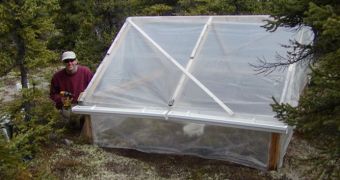For many years, researchers believed that, with the rise in global temperatures our planet is currently experiencing, microbes in the ground would boost their greenhouse gas production as well, contributing to climate change. But new data from American investigators seems to suggest that the influence of these microorganisms, though significant, is still lower than what researchers first predicted. This is good news for the environment, the group adds, given that predictions based on past knowledge were rather bleak, the US National Science Foundation (NSF) reports.
“Microbes continually surprise us in the diverse ways they respond to environmental conditions. Microbes play a central role in ecological processes, and their responses change our understanding of natural communities in fundamental ways,” says the NSF Division of Environmental Biology program director Saran Twombly. The DEB funded the current investigation, alongside the NSF Advancing Theory in Biology program. The second initiative is a part of the Foundation's Directorate for Biological Sciences Office of Emerging Frontiers. The US Department of Energy (DOE) also supported the work financially.
In the research, published online this week in the esteemed journal Nature Geoscience, scientists at the University of California in Irvine (UCI), Colorado State University (CSU) and Yale University say that the findings apply to dark, rich soils, regardless on which continent they are located. The main finding of the study was that, as temperatures rise, microbes begin to produce carbon dioxide faster in the ground. But this is not new knowledge. What the researchers learned is that, rather than continuously accelerating their CO2 production, the microbes at one point “overheat,” and then produce the gas more slowly. The work was led by UCI ecologist Steve Allison.
“Microbes are the engines that drive carbon cycling in soils. In a balanced environment, plants store carbon in the soil and microbes use that carbon to grow. Enzymes produced by microbes convert soil carbon into atmospheric carbon dioxide,” Allison explains. “The issue we have in predicting whether soil carbon loss will accelerate climate warming is that the microbial processes causing this loss are poorly understood. More research in this area will help reduce uncertainties in climate prediction,” says Yale professor Mark Bradford.
“When we developed a model based on the actual biology of soil microbes, we found that soil carbon may not be lost to the atmosphere as the climate warms. Conventional ecosystem models that didn't include enzymes did not make the same predictions,” Allison reveals.

 14 DAY TRIAL //
14 DAY TRIAL //